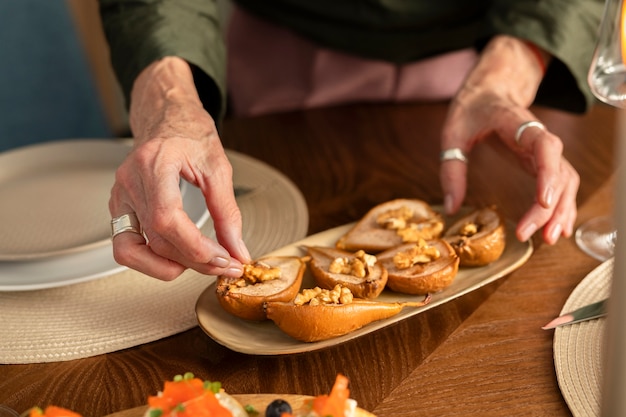As an avid outdoorsman, I’ve always appreciated the connection between food and nature. There’s something deeply satisfying about using what the land provides, and that’s exactly what drew me to the world of squirrel hunting and cooking. It's not just about putting meat on the table; it's about understanding the delicate balance of ecosystems and appreciating the value of sustainable practices. In this article, we'll delve into the fascinating world of squirrel recipes, exploring why this often-overlooked game meat deserves a place on your dinner table.
(Part 1)
Why Squirrel?

Let's face it, "squirrel" isn't exactly the first thing that comes to mind when you think of "game meat." Most people associate it with bushy tails and mischievous antics, not a delicious culinary adventure. But I'm here to tell you that squirrels offer a surprising combination of sustainability, abundance, and, dare I say, deliciousness.
A Sustainable and Abundant Source of Protein
Squirrels are incredibly abundant in many parts of the world. They're not an endangered species, and in some areas, they're even considered pests due to their population growth. This makes them a highly sustainable source of protein. By incorporating squirrel into your diet, you're directly supporting a natural population control system, lessening the need for artificial pest management methods. It's a win-win for both you and the environment.
A Delicious and versatile meat
But let's be honest, the real reason we're here is the taste. Squirrel meat is remarkably delicious. Its leanness offers a delicate, slightly sweet flavor that's surprisingly reminiscent of chicken. It's not gamey or overpowering, making it incredibly versatile and adaptable to a wide range of cooking styles.
Getting Started: Harvesting Your Squirrel

Now that you're convinced about the benefits of squirrel, let's talk about the actual process of acquiring it. There's a certain charm to squirrel hunting that draws many people to the experience. It's an opportunity to connect with nature, hone your skills, and appreciate the rewards of a successful hunt.
Hunting Methods: Exploring Your Options
There are various methods for hunting squirrels, each with its own advantages and considerations. Let's explore a few of the most common methods:
- Trapping: This is a humane and efficient way to catch squirrels, especially for those who prefer a less hands-on approach. You can find a variety of traps at most sporting goods stores, from cage traps to live traps. Cage traps are designed to capture the squirrel without causing harm, while live traps allow you to release the animal if you choose not to harvest it.
- Shooting: This is a more traditional method that requires practice and a good understanding of firearm safety. It's important to choose a firearm that's appropriate for small game, such as a .22 caliber rifle or a shotgun with small shot.
- Snaring: This method uses a snare to trap the squirrel's neck. It's essential to use a snare that's humane and safe, and to be mindful of animal welfare.
Laws and Regulations: Understanding the Rules
Before you head out on your squirrel hunting adventure, it's crucial to understand the local laws and regulations. Every area has its own rules about hunting seasons, licenses, and methods. Always obtain a hunting license and follow all safety guidelines to ensure a responsible and ethical hunting experience.
Field Dressing: Preparing Your Catch
Once you've successfully hunted your squirrel, the next step is field dressing. This involves removing the fur, entrails, and head. Don't worry, it's not as daunting as it sounds. There are countless online resources and videos that can guide you through the process. The key is to be sanitary and use a clean knife to avoid contaminating the meat.
Squirrel Recipes: Exploring the Flavors

(Part 2)
Now we get to the fun part – the delicious world of squirrel recipes! I've compiled a collection of classic favorites, personal go-tos, and some creative twists that will tantalize your taste buds.
Classic Squirrel Stew: A Hearty and Comforting Dish
This is a timeless recipe that's perfect for a chilly evening. The hearty flavors of the stew will warm you from the inside out.
- 2 squirrel legs and thighs, cut into bite-sized pieces
- 1 onion, chopped
- 2 carrots, chopped
- 2 celery stalks, chopped
- 4 cups beef broth
- 1 tablespoon flour
- Salt and pepper to taste
Instructions:
- In a large pot or dutch oven, brown the squirrel pieces over medium heat. This will help to lock in the flavors and create a richer base for the stew.
- Add the chopped onion, carrots, and celery to the pot and cook until softened, about 5 minutes.
- Stir in the flour and cook for 1 minute, allowing the flour to absorb some of the liquid and thicken the stew.
- Pour in the beef broth and bring to a boil.
- Reduce heat to low, cover, and simmer for 1.5 hours, or until the squirrel is tender.
- Season with salt and pepper to taste. Remember to adjust the seasoning as needed throughout the cooking process.
- Serve hot with crusty bread or your favorite sides, such as mashed potatoes or a simple green salad.
Squirrel and Mushroom Stir-Fry: A Modern and Delicious Take
This recipe is a lighter and more contemporary approach to squirrel, incorporating the freshness of vegetables and the savory depth of mushrooms.
- 1 squirrel leg and thigh, cut into small pieces
- 1 tablespoon soy sauce
- 1 tablespoon cornstarch
- 1 tablespoon vegetable oil
- 1 onion, sliced
- 1 bell pepper, sliced
- 1 cup sliced mushrooms (cremini or shiitake are excellent choices)
- 1/2 cup chicken broth
- Salt and pepper to taste
Instructions:
- In a bowl, combine the squirrel pieces with soy sauce and cornstarch. Let it marinate for at least 30 minutes to allow the flavors to penetrate the meat.
- Heat the oil in a large skillet or wok over medium-high heat. Add the marinated squirrel and cook until browned on all sides.
- Remove the squirrel from the skillet and set it aside. Add the sliced onion, bell pepper, and mushrooms to the skillet and cook until softened, about 5 minutes.
- Pour in the chicken broth and bring to a boil.
- Return the squirrel to the skillet and simmer until heated through and the sauce has thickened slightly. Season with salt and pepper to taste.
- Serve over rice or noodles.
Roasted Squirrel with Rosemary and Garlic: A Gourmet Experience
This recipe elevates squirrel to a whole new level, showcasing the meat's natural flavors and offering a beautifully presented dish.
- 1 squirrel, cleaned and cut into 8 pieces
- 1 tablespoon olive oil
- 1 teaspoon salt
- 1/2 teaspoon black pepper
- 2 sprigs of rosemary
- 4 cloves of garlic, minced
Instructions:
- Preheat oven to 375 degrees Fahrenheit (190 degrees Celsius).
- In a bowl, combine the squirrel pieces with olive oil, salt, pepper, rosemary sprigs, and minced garlic. Toss to coat evenly.
- Place the squirrel pieces on a baking sheet lined with parchment paper. This will make cleanup a breeze!
- Roast for 30-40 minutes, or until the squirrel is cooked through and golden brown.
- Serve immediately. The rosemary and garlic will infuse the meat with incredible flavor.
Squirrel: Beyond the Kitchen
(Part 3)
Squirrel hunting offers benefits that extend far beyond the culinary realm. It's a way to connect with the outdoors, practice traditional skills, and embrace a sense of self-reliance and sustainability.
Connecting with Nature: A Deeper Appreciation
Hunting and preparing squirrel meat is a powerful way to build a deeper connection with the natural world. It forces you to slow down, observe your surroundings, and appreciate the delicate balance of ecosystems. It's a reminder that we are part of nature, not separate from it.
Traditional Skills: Honing Your Abilities
Squirrel hunting also helps you hone traditional skills that are often neglected in modern society. It teaches you about foraging, tracking, survival, and understanding animal behavior. These are valuable skills that can be applied to various aspects of your life, enhancing your appreciation for self-sufficiency and resourcefulness.
Sustainability and Responsibility: Making a Difference
By incorporating squirrel into your diet, you're actively contributing to a more sustainable food system. You're reducing your reliance on factory farms and mass-produced meat, opting for a protein source that's naturally abundant and locally sourced. This not only benefits your health and the environment but also supports a more balanced and resilient food system.
FAQs: Answering Your Questions
(Part 4)
I understand that you might have questions about squirrel hunting and consumption. Let's address some common concerns and misconceptions.
1. Isn’t Squirrel Meat Gamey?
This is a common misconception. Squirrel meat is actually quite mild and can be compared to chicken in terms of its flavor. The key to avoiding any strong gamey flavor is to cook the meat properly and use herbs and spices to enhance its natural flavors.
2. Is Squirrel Hunting Difficult?
It can be challenging, but it's not impossible. There are many resources available to help you learn the basics, from online tutorials to experienced hunters who are willing to mentor you. The most important thing is to be patient, practice, and learn from your mistakes.
3. Isn’t Squirrel Meat High in Cholesterol?
Actually, squirrel meat is very lean and low in cholesterol. It's a healthy and nutritious option compared to other red meats.
4. Is Squirrel Hunting Legal?
The legality of squirrel hunting varies by location. You'll need to check the specific laws and regulations in your area before you hunt. Always obtain a hunting license and follow all safety guidelines.
5. Can I Buy Squirrel Meat Instead of Hunting?
It's becoming more common to find squirrel meat for sale at specialty butcher shops and online retailers. If you're not comfortable hunting yourself, this is a great alternative.
Squirrel: A Hidden culinary gem
(Part 5)
I've always been drawn to the idea of connecting with nature, whether it's through hiking, fishing, or hunting. Squirrel hunting, in particular, has become a deeply meaningful experience for me. It's not just about getting food on the table; it's about a deep appreciation for the natural world and the sustainable practices that allow us to thrive in harmony with it.
The next time you're looking for a unique and delicious protein source, give squirrel a try. You might be surprised at how versatile and flavorful this often-overlooked game meat can be.
Exploring More Squirrel Recipes: A Culinary Adventure
(Part 6)
We've just scratched the surface of the incredible world of squirrel recipes. There are countless possibilities, from classic Southern fare to modern culinary twists that will leave you wanting more.
Squirrel and wild rice soup: A Hearty and Flavorful comfort food
This hearty soup is a perfect comfort food, especially when the weather turns cold. It's rich in flavor and texture, with the earthy notes of wild rice complementing the squirrel meat beautifully.
- 1 squirrel, cut into pieces
- 1 onion, chopped
- 2 celery stalks, chopped
- 2 carrots, chopped
- 1 cup wild rice (rinsed)
- 6 cups chicken broth
- 1 teaspoon dried thyme
- 1/2 teaspoon salt
- 1/4 teaspoon black pepper
Instructions:
- In a large pot or Dutch oven, brown the squirrel pieces over medium heat.
- Add the chopped onion, celery, and carrots to the pot and cook until softened, about 5 minutes.
- Stir in the rinsed wild rice, chicken broth, thyme, salt, and pepper.
- Bring to a boil, then reduce heat to low, cover, and simmer for 45 minutes, or until the squirrel is tender and the rice is cooked through.
- Serve hot with a dollop of sour cream or a sprinkle of fresh parsley.
Squirrel Chili: A Hearty and Flavorful Crowd-Pleaser
This chili is packed with flavor and protein, perfect for a chilly night or a game day gathering. The combination of squirrel, beans, and tomatoes creates a rich and satisfying dish that's sure to please everyone.
- 1 squirrel, cut into pieces
- 1 onion, chopped
- 1 green bell pepper, chopped
- 1 (15-ounce) can black beans, drained and rinsed
- 1 (15-ounce) can kidney beans, drained and rinsed
- 1 (15-ounce) can diced tomatoes, undrained
- 1 (15-ounce) can tomato sauce
- 1 tablespoon chili powder
- 1 teaspoon cumin
- 1/2 teaspoon salt
- 1/4 teaspoon black pepper
Instructions:
- In a large pot or Dutch oven, brown the squirrel pieces over medium heat.
- Add the chopped onion and green bell pepper and cook until softened, about 5 minutes.
- Stir in the drained and rinsed black beans, kidney beans, diced tomatoes, tomato sauce, chili powder, cumin, salt, and pepper.
- Bring to a boil, then reduce heat to low, cover, and simmer for at least 30 minutes, or until the flavors have melded.
- Serve hot with your favorite toppings, such as shredded cheese, sour cream, or chopped onions.
Squirrel and Apple Sausage: A Sweet and Savory Delight
This recipe takes inspiration from traditional sausage recipes and adds a touch of sweetness from apples. The combination of savory squirrel and sweet apples creates a delicious balance of flavors.
- 1 squirrel, ground
- 1/2 cup chopped onion
- 1/2 cup chopped apple (Granny Smith or Honeycrisp are good choices)
- 1/4 cup bread crumbs
- 1 teaspoon salt
- 1/2 teaspoon black pepper
- 1/4 teaspoon sage
- 1/4 teaspoon thyme
Instructions:
- In a large bowl, combine the ground squirrel, onion, apple, bread crumbs, salt, pepper, sage, and thyme.
- Mix well until all ingredients are combined.
- Form the mixture into sausage shapes. You can use sausage casings if you'd like, or simply shape the mixture into patties.
- You can either cook the sausage in a skillet over medium heat for about 10-12 minutes per side, or grill them over medium heat for about 5-7 minutes per side.
- Serve hot with your favorite sides, such as mashed potatoes, gravy, or a simple salad.
Beyond the Plate: The Ethical and Environmental Impact
(Part 7)
As we explore the culinary world of squirrel, it's important to consider the ethical and environmental implications of hunting and consuming this game meat. We must strive to maintain a balance between our needs and the well-being of our ecosystems.
Ethical Hunting Practices: A Responsibility to the Wildlife
Ethical hunting practices are essential for ensuring the sustainability of squirrel populations. This includes:
- Respecting Hunting Regulations: Always obtain a hunting license and follow all laws and regulations related to squirrel hunting in your area. This ensures that you are hunting responsibly and contributing to the conservation efforts in your region.
- Using Humane Hunting Methods: Choose methods that minimize pain and suffering for the animal. Trapping, for example, is a humane method that allows for quick and painless dispatch.
- Harvesting Only What You Need: Avoid overharvesting and leave some squirrels in the population to ensure their long-term survival.
- Respecting Wildlife Habitats: Minimize your impact on the surrounding environment and leave the area as you found it.
Environmental Considerations: Making a Positive Impact
Incorporating squirrel into your diet can also have positive environmental impacts:
- Reducing Meat Consumption: By choosing a sustainable and locally sourced protein source, you're reducing your reliance on factory farms and the environmental damage associated with mass-produced meat. This contributes to a more sustainable and ethical food system.
- Supporting Biodiversity: Hunting squirrels can help control their populations and prevent them from becoming overpopulated, which can negatively impact native ecosystems. This helps maintain a healthy balance within the environment.
Squirrel: A Culinary Adventure Awaits
(Part 8)
The world of squirrel recipes is vast and exciting, offering a unique and delicious culinary adventure. From classic stews to modern stir-fries, there’s something for every palate.
Remember, squirrel is not just a source of protein; it's a gateway to a deeper connection with the natural world. It's a reminder of the delicate balance of ecosystems and the importance of responsible and ethical hunting practices.
So, if you’re looking for a new culinary adventure, a sustainable protein source, or a deeper connection with nature, I encourage you to explore the world of squirrel. You might be surprised at what you discover.
Everyone is watching

Prime Rib Roast Cooking Time Chart: Per Pound Guide
Cooking TipsPrime rib roast. Just the name conjures images of lavish dinners, crackling fires, and hearty laughter. It’s ...

How Long to Bake Potatoes in the Oven (Perfect Every Time)
Cooking TipsBaked potatoes are a staple in my kitchen. They're incredibly versatile, delicious, and surprisingly easy to m...

Perfect Rice Every Time: The Ultimate Guide to Cooking Rice
Cooking TipsAs a self-proclaimed foodie, I've always been a bit obsessed with rice. It's the foundation of countless cuisi...

The Ultimate Guide to Cooking Asparagus: Tips, Techniques, and Recipes
Cooking TipsAsparagus. The mere mention of this spring delicacy conjures up images of vibrant green spears, crisp and burs...

Ultimate Guide to Cooking the Perfect Thanksgiving Turkey
Cooking TipsThanksgiving. Just the word conjures up images of overflowing tables laden with delicious food, the scent of r...
